In the field of politics, women are beginning to emerge as forces to be reckoned with in several countries around the world. However, assessing gender equality goes beyond the realm of politics. Here’s our look at key events in 2015 in Nigeria and our assessment of whether or not they pushed for gender equality in the country, or not.
The VAPP Bill

On the 25th of May 2015, former president of Nigeria, Goodluck Ebele Jonathan, signed the Violence Against Persons (Prohibition) Bill into law. The act prohibits all forms of violence against persons in public and private life. It seeks to protect vulnerable persons in the country from persecution and victimization, particularly women and children. After several years of activism by the civil society, the bill was first presented to the House of Representatives in May 2002, the Bill on Violence Against Women became a Bill on Violence Against Persons in 2008 when it was harmonized with 8 other Bills on gender-based violence in the National Assembly. Although it took seven years for the bill to become law, it shows the Nigerian society seeks to protect women from violence directed at them disproportionately, exhibiting concern towards the future of its citizens who are considered most vulnerable.
Score – YES
President Buhari’s appointment of women within his administration

Muhammadu Buhari officially assumed the position of president of Nigeria in May 2015. Before this, he promised to implement the National Gender Policy which recommends 35 percent affirmative action in favor of women to bridge gender gaps in political representation in both elective and appointive posts at all levels by 2015. However, he failed to fulfill his promise as he appointed just three women into these positions, amounting to a mere 15 percent as opposed to the recommended percentage.
The poor representation of women in President Buhari’s cabinet suggests that the president does not have as much faith in the abilities of women as he claimed to after being raised by his grandmother. This may indicate a step backward for the country as the immediate past president, Goodluck Jonathan, had a cabinet with 33 percent of women by 2013.
Nigerians have, in the past, expressed some faith in the capability of women occupying key positions in government. Against the backdrop of the 2015 International Women’s Day celebrated on the 8th of March, NOIPolls conducted a poll to gauge the perception of Nigerians on Women in Governance.
The poll revealed that more female (70 percent) than male (53 percent) Nigerians appreciate the idea of women contesting for political positions in the country to a very large extent. Analysis by geo-political zone revealed that the South-East zone (70 percent) accounted for the largest proportion of Nigerians who support the idea of women contesting for political positions in Nigeria to a very large extent. In addition, respondents aged 61 years and above showed the highest level of support for women contesting for political positions.
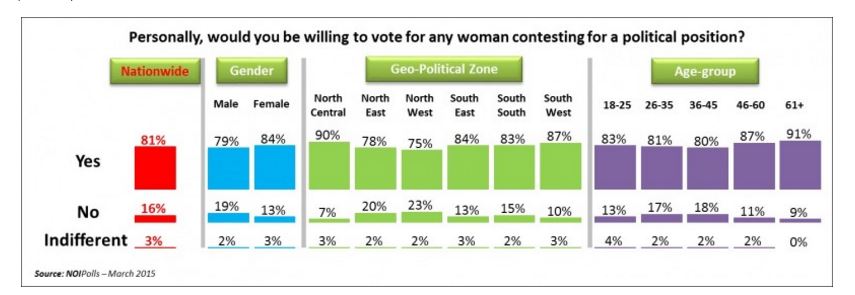
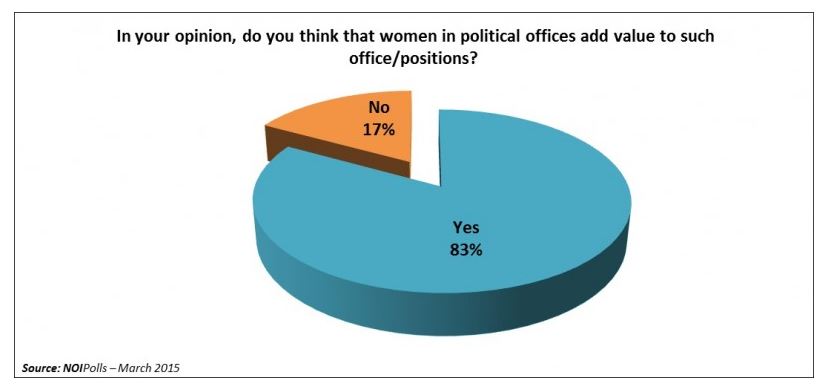
Score – NO
Film making
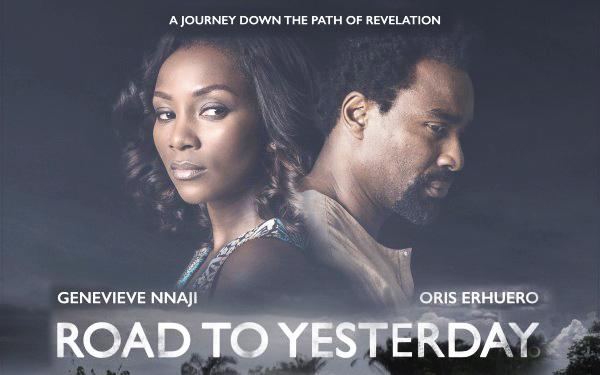
2015 was a landmark year for several women in the film industry, new ventures became laudable successes. Take Nollywood actress Genevieve Nnaji for instance, this year she produced her own movie, Road to Yesterday.
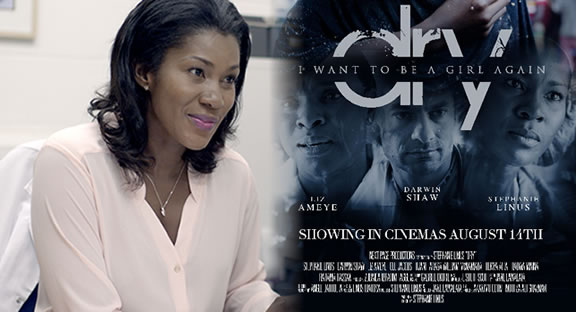
Also, Stephanie Okereke-Linus produced, Dry, which was centered on the effects of child marriage resulting in Vesicovaginal Fistula (VVF). Dry went on to win a 2015 Best of Nollywood award for the best social message, due to the awareness on VVF it created.
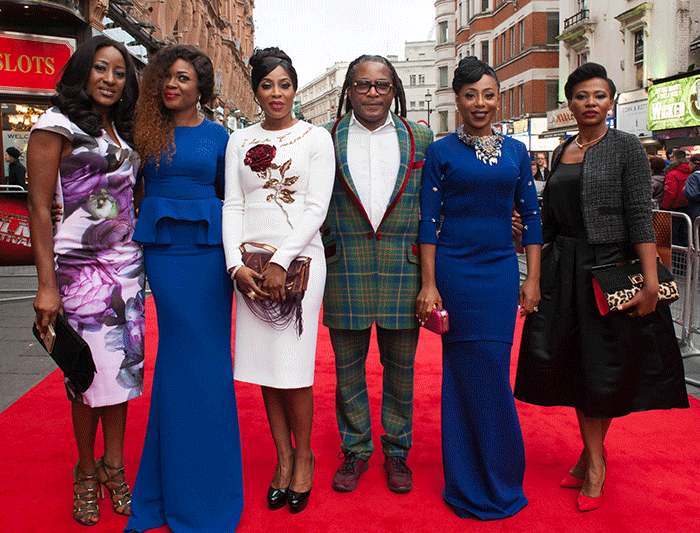
Everyone knows Mo Abudu is the Queen of chat, she has been able to navigate her way through hosting a talk show, Moments with Mo, as well as launching African entertainment television, EbonyLife Tv. This year, EbonyLife Tv produced Fifty, a movie set in Lagos, Nigeria, focused on women and their lifestyles. Themes surrounding love and lust, faith and reason, reality and obsession, power and vulnerability, wisdom and youth, were all explored in the film. Fifty was the only movie selected from Nigeria (and one of only five films from the entire continent of Africa) from the 238 films selected globally for screening at the 2015 British Film Institute London Film Festival. Also, the movie, Fifty will be featured on Netflix to over 65 million global audiences in 50 countries from December 28, 2015.
Score – YES
Activism

The Young African Leaders Initiative (YALI), as introduced by President Barack Obama of the United States of America, had a few interesting women who happen to be doing very good work in Nigeria this year. For instance, we have Grace Alache Jerry, a gospel music artist and a Miss Wheelchair National Queen, who is improving the narrative on disability rights in Nigeria. According to Influence with Aquinas, Grace works as a director at Inclusive Friends, providing direction and inspiration for change. She also serves as WaterAid Nigeria’s official spokesperson for the disabled on the issues of water, sanitation and hygiene. She also works to ensure inclusive access for persons with disabilities and toward ending violence through benefit concerts where the proceeds provide toilets for schools serving children with disabilities.

Although it is unfortunate that the Chibok girls are yet to be released, an activist for the return of the girls, Esther Ibanga, was awarded a Japanese peace prize amounting to $170,000 for her fight against the terror activities of Boko Haram in February 2015. The Niwano Peace Prize was given to Esther Ibanga for her anti-terrorism activism. This Is Africa reported that according to the group, “Esther has worked extensively to foster and facilitate reconciliation between conflicting religious and tribal groups,” setting up an organization [Women Without Walls Initiative] that has all tribal women leaders as its members.
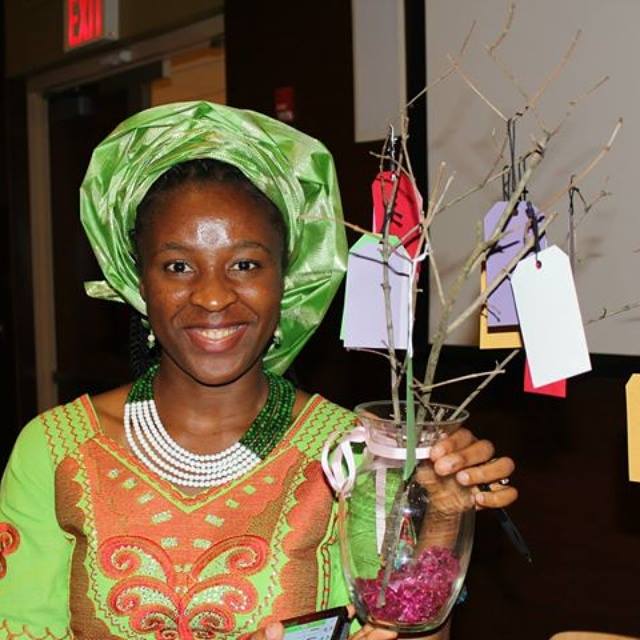
Chimnonso Traffina Ibe is the founder of the Traffina foundation and for the past few years has been actively involved in providing necessary birth kits to rural women in Nigeria so as to reduce maternal mortality rates. Chimnonso was also one of the YALI fellows for this year and in August 2015, the foundation expressed optimism that the Moms and Newborn Delivery Kits will be a significant help in reducing maternal mortality rates in the country’s rural areas. But the foundation is not only restricted to providing care to new mothers, they also cater to internally displaced persons within the country. Also, in August 2015, the foundation gave out free health care sessions to internally displaced persons in the Federal Capital Territory, Abuja, with support from the TY Danjuma Foundation.
Score – YES
The Arts
In November 2015, Nigerian author, Chimamanda Ngozi Adichie won the Best of the Best award at the Baileys Women’s Prize for Fiction (BWPFF) for her literary work, ‘Half of a Yellow Sun’. The BWPFF is one of the most prestigious, celebrated and successful literary awards in the world. It celebrates full length fiction written by women across the globe. According to Mauriel Gray, chair of the judges of the BWPFF, “Chimamanda’s achievement makes Half of a Yellow Sun not just a worthy winner of this most special of prizes, but a benchmark for excellence in fiction writing.”
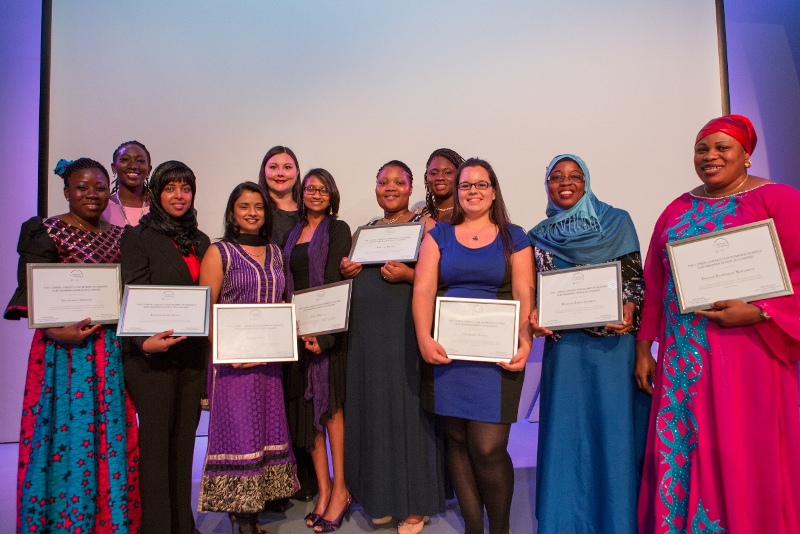
Recently, four Nigerian women scientists, Rasheedat Mahamood, Olubukola Adenubi, Olotu Ifeoluwa and Majidah Hamid-Adiamoh were awarded Doctoral Fellowships by L’Oréal-UNESCO for the Women in Science Initiative. They were honored for their work in Life & Engineering Sciences, as well as Food & Water Security and Health. The four women were the only Nigerians out of 12 other awardees from other African countries. Managing Director of L’Oreal South Africa, Sandeep Rai, expressed pride in the selected women’s achievements. “For the last 17 years, with the For Women in Science program, we have been fighting to advance the cause of women scientists worldwide. Much has been achieved: more than 2,000 women have been recognized worldwide, the program has gained recognition from the international scientific community, a springboard to enable women to go further and rise to greater heights. Science is part of our DNA and we are really proud of all the women who continue to make a difference in Africa through our program”, he said.
Score – YES
Sports
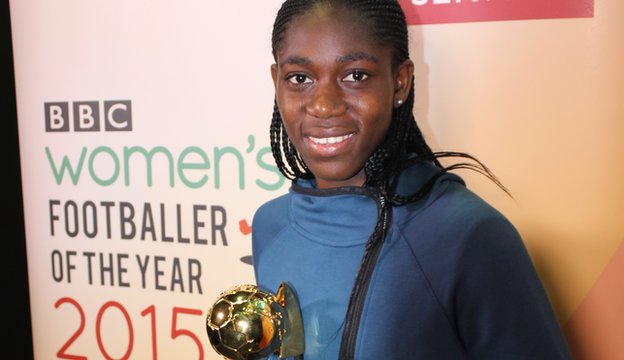
At the age of 20, female soccer player for Liverpool LFC, Asisat Oshoala was named BBCs women footballer of the year 2015. She is the first person to win the new award introduced by the BBC World Service, she beat Spain’s Veronica Boquete, Germany’s Nadine Kessler, Scot Kim Little and Brazil’s Marta to clinch the award. After receiving her award, the BBC reported that she said the honor was a big lift for Nigeria before the World Cup and would help inspire young players in her homeland. “Support for women’s football in Nigeria is now growing very high. I know my Liverpool Ladies coach is going to be happy right now. Before I left the UK he called me and said to me ‘don’t worry I hope you win the award and we’re going to celebrate it when you come back”, she said.
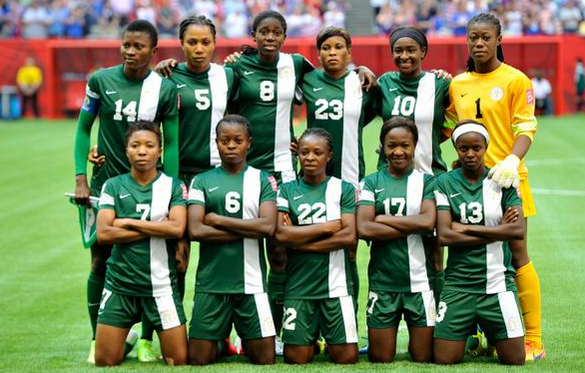
Also, in 2015, the Nigerian Super Falcons were named the number one female football team by the world’s football governing body, FIFA. Despite shortcomings, the Super Falcons emerged 37th on FIFA’s ranking, they rose from 38th place to 37th in the world with 1602 points and remain number one in Africa. Following closely are Cameroon who dropped two places to finish 47th and second in Africa with 1496 points. Ghana moved up two places and earned 1475 points to finish 50th in the world and third in Africa while Equatorial Guinea dropped three spots to fourth, gathering 1452 points. South Africa, Côte d’Ivoire, Algeria, Morocco, Egypt and Senegal complete the top ten teams in Africa.
Score – YES









